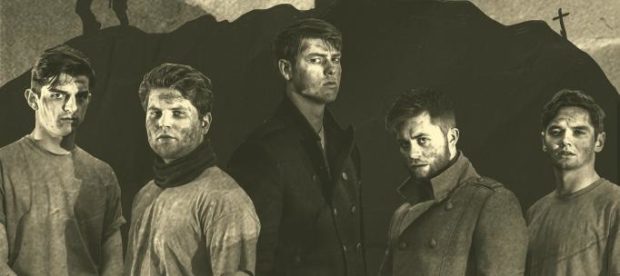You have no items in your cart. Want to get some nice things?
Go shopping
For those of us who don’t know, war is hell. That’s what we’ve been told by every war film and documentary floating around the internet, but how many of us really know what it’s like when circumstance has led you to be on the front line?
In the centenary year of the Battle of the Somme, Incognito Theatre Company have revived Erich Maria Remarque’s classic 1928 novel, exposing the physical, mental strain of trench warfare on a group of young Germans. Right off the bat, we learn war is no adventure, thanks to director Roberta Zuric’s technique of cold temperature and smoky atmosphere. Whether this was an intentional method by Zuric, the audience are instantly transported to the Western Front, complete with the naivety that many a soldier had.
In Hannah Wisher‘s production, the soldiers’ vulnerability is nothing short of poetry. The play opens with a senior German officer manipulating, even bullying, them to enlistment. They are naïve boys; barely eighteen years old, looking for an adventure, one they are thoroughly unprepared for. “Death,” Remarque wrote at the beginning of the book, “is not an adventure”. Behind the bravado they share with each other including what then was considered “a healthy appetite for the opposite sex”, to get them from one day to the next.
We see what they are forced to endure. First the early tells, such as bed-wetting, then the more profound ramifications: a permanent loss of their appetite for life. They start out excited to see what the world has to offer; they finish as husks, bereft of optimism and with no yearning for adventure. In terms in maturity they were mere children when they enlisted; and while they playfully discuss what they’d do should peace day come, Kemmerich’s (Angus Doughty) statement “There’s no such thing as peace time” signals their new attitude. We also, unknowingly, witness the experiences that lead to post traumatic stress disorder. They watch their childhood friends die before their very eyes, and then without a hint of sarcasm come to the conclusion they’ll never be coming home – because how could they adapt to that comforts of a home after this?
The theme of death is alive in living colour. From the dead bodies they see in the trenches to a soldier who dies while being carried to safety, the reality of mortality is so profound that an amputated soldier – who shortly dies – is told to see the positive side in that he’s still living. Such sacrilege makes them shell-shocked on stage.
The acting in this production was nothing short of phenomenal. The young soldiers, faced with impending death, are the very picture of trauma and nervous shaking; these are heart-wrenching performances. It’s safe to say by now that this no Disney production. Given the emotional and rough nature of the play, the moments of comedy serve only to soften the blow of the plot.
While physically this was a five-man cast, there was one other silent character on stage: the sound and lighting. Oscar Maguire’s loud echo of bombs and gunshots throughout the theatre was an impressive facsimile of WWI; the use of the spotlight to allow each soldier to pour out their true emotions – during an era in which men were taught to carry on and deal with it – was superb. These monologues show the ugliness and distraught nature of war, leaving Paul Baumer (Charlie MacVicar), to yearn for the love and comfort of his mother.
All Quiet on the Western Front continues at the Pleasance Theatre until Dec 23. Tickets are £12 (£10 concessions). See the Incognito Theatre Company’s website for details of any future tour dates around the UK.

About B.L. Sherrington
B. L. Sherrington is an aspiring novelist. In between writing short stories and reviews, Sherrington is penning a science fiction/fantasy novel and co-writing a play. An experienced journalist, Sherrington has previously written for Neon, The Metropolist, DEUX HOMMES and SANT Magazine. Previously a student at Manchester Metropolitan University, Sherrington is preparing to return to education at the Open University to study Creative Writing.




